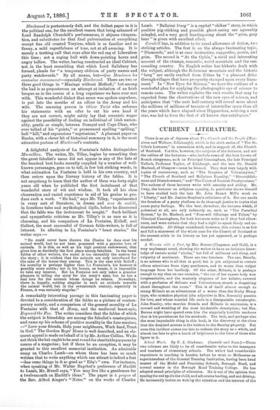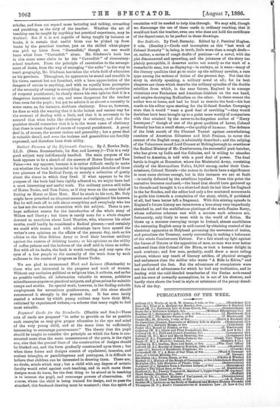School Work. By F. J. Gladman. (Jerrold and Sons.)—These two
volumes are likely t3 be of considerable value to the managers and teachers of elementary schools. The writer had considerable experience in teaching in London before he went to Melbourne as superintendent of the General Training Institution, having been head master of the Model and Practising Schools, Borough Road, and normal master in the Borough Road Training College. He has adopted sound principles of education. He is not of the opinion that sparing the rod spoils the child, and advocates leading, and not driving. He incessantly insists on waking the attention and the interest of the
scholar, and does not regard mere lecturing and talking, rewarding and punishing, as the duty of the teacher. Whether the art of teaching can be taught by anything but practical experience, may be doubted. But if it is not capable of being taught by lectures or books, it is certain that usef al hints can be picked up from books by the practical teacher, just as the skilled whist-player can pick up hints from "Cavendish," though no one would learn whist from " Cavendish " alone. Mr. Gladman's book has in this sense some claim to be the " Cavendish " of elementary- school teachers. From the principle of association to the arrange- ment of desks, from the way of managing "the sulks" to the way to teach geography, Mr. Gladman has taken the whole field of education as his province. Throughout, he appears to be sound and sensible in his views, earnest but not fanatical, with a keen appreciation of the dangers of excess in anything, and with an equally keen perception of the necessity of energy in everything. For instance, on the question of corporal punishment, he clearly shows his own opinion that it is a dangerous instrument to use, and more dangerous for the teacher than even for the pupil ; but yet he admits it as almost a necessity in some cases, as, for instance, stubborn obstinacy. Even so, however, he does so with the warning that it is the laziest and easiest way for the moment of dealing with a fault, and that it is necessary to be assured that what looks like obstinacy is obstinacy, and that the punisher should remember that it is in the worst cases of obstinacy that there is most danger of excess of corporal punishment. A great deal is, of course, the merest truism and generality ; but a great deal is valuable detail, and even the truisms and generalities are forcibly expressed, and therefore have their utility.



































 Previous page
Previous page